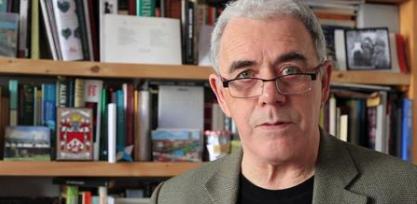navegantes necesarios /
otras coordenadas
Theo Dorgan
/ Hablando con mi padre
Hablando con mi padre
¿Cómo podría invocar ahora a ese hombre, mi padre,
que año tras año agotador se iba a trabajar,
su corazón enterrado bajo el peso del deber, él mismo
enterrado antes de tiempo para que nosotros pudiéramos vivir?
¿Cómo podría sentarme aquí y explicarle a su espectro
que, sí, este es el trabajo que hago, por el que moriste,
este es el uso que hago de todo ese sacrificio -
yo manejo palabras como tú manejabas neumáticos pesados.
Es cierto, no hay ningún hedor a goma,
ningún calor del vulcanizado, ninguna rabia contra los gerentes,
contenida tanto por necesidad como por orgullo-
pero, padre, la inutilidad es de largo alcance.
A menudo, mientras yo crecía lentamente, dejabas escapar
una palabra, un gesto impotente o una mirada
que me sacudía hasta las raíces. Yo sentía el vacío
que tú repelías, obstinada, sudorosa, heroicamente.
Yo tengo ahora todo lo que a ti te faltó, principalmente
libertad para decidir el trabajo del día-
eso suena a libertad, ¿no es así? La verdad
es que odio tanto como tú trabajar por turnos.
Hay días últimamente, a medida que sumo años,
en que siento tus nervios deslizarse en mi esqueleto,
te veo en el espejo, al afeitarme-
cálido, escéptico, cansado, algo resignado,
pero también algo más: tu forma atlética
de plantar los pies cuando estabas afligido,
la espalda firme para el golpe que pudiera venir,
listo y preparado para defender lo que te importaba.
¿Qué era lo que más te afligía? La pregunta escapa
cuando ataco con mi pluma, torpe como siempre-
ni siquiera sé bien qué me aflige a mí,
ignorante como cuando cabalgaba en tu rodilla.
¿Qué harías conmigo, me pregunto, sentado aquí
ya bien pasada la medianoche, buscando palabras para
traerte de vuelta, solicitando el consuelo de tu sombra
para la extraña, inútil criatura que hiciste?
Este es el final de toda esa educación,
el vacío está tan cerca de mí como siempre lo estuvo de ti.
Hago poemas como tú y Rose hacían hijos,
ciegamente, porque debo.
Padre, camarada, me mueve la misma ira tuya
con el mundo, pero no tu paciencia. Te hago esto,
un juguete con palabras, para reintroducirme
y preguntar: ¿qué debo hacer para ser tu hijo otra vez?
Speaking to My Father
How should I now call up that man my father,
who year after weary year went off to work,
buried his heart beneath a weight of duty,
buried himself early so that we might live?
How should I sit here and explain to his shade
that, yes, this is the work I do you died for,
this is the use I make of all that sacrifice-
I move the words as you moved heavy tyres.
True, there is no sickening stench of rubber,
no heart from the curing pans, no rage
at management, choked back by need as much as pride-
but father, the range of uselessness is wide.
Often, as I grew slowly, you´d let slip
a word, a helpless gesture or a look
that shook me to the roots. I´d sense the void
you stubbornly, heroically sweated back.
Now I have everything you lacked, above all
freedom to shape the workload for the day-
it sounds like freedom, doesn´t it? The truth is,
I hate the shift work just as much as you did.
There are days lately, as I thicken in years,
when I feel your sinews shift inside my frame,
I catch a look of yours in the mirror, shaving-
mild, sceptical, weary, a bit resigned,
But something else too: your athlete´s way
of planting the feet carefully when troubled,
shoulder square to the blow that may come,
ready and fit to defend what you hold dear.
What troubled you most? The question shies away
when I stab with my pen, clumsy as ever
-I don´t even rightly know what troubles me,
ignorant as when I rode upon your knee.
What would you make of me, I wonder, sitting here
long after midnight, searching for the words to
bring you back, soliciting the comfort of your shade
for the odd, useless creature that you made?
Here is the end of all that education,
the void is as close to me as it ever was to you.
I make poems as you and Rose made children,
blindly, because I must.
Father, comrade, the same anger with the world
but not your patience moves me. I make you this,
a toy in words to re-introduce myself
and to ask: what must I do to be your child again?

Theo Dorgan
Theo Dorgan nació en Cork, Irlanda, en 1953. Estudió en el University College de esa ciudad. Es poeta, prosista, guionista y traductor. Fue codirector del Cork Film Festival y director de Poetry Ireland. Algunos de sus libros son: The ordinary house of love (1991), Rosa Mundi (1995), Greek (2010) y Nine bright shiners (Dedalus Press, 2014). Vive en Dublin.
El poema que aquí se reproduce pertenece al libro La memoria esparcida, poesía irlandesa actual, cuya selección, prólogo y traducción estuvo a cargo de Gerardo Gambolini. (detodoslosmares editorial, 2015).
Sitio oficial: http://www.theodorgan.com/
Un nota sobre él: http://www.irishexaminer.com/lifestyle/features/
this-much-i-know-theo-dorgan-poet-283099.html